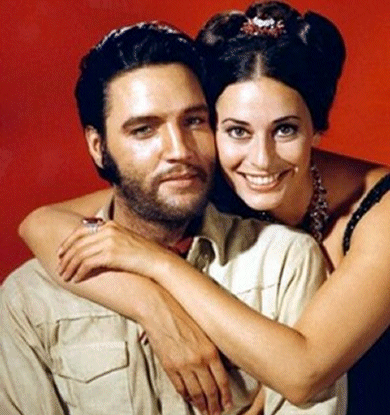Sixties
City presents
a wide-ranging series of
articles on all aspects of the Sixties, penned by the creator of the iconic
60s music paper Mersey
Beat
|
Sixties
City presents
a wide-ranging series of
articles on all aspects of the Sixties, penned by the creator of the iconic
60s music paper Mersey
Beat
|
|||||
|
 |
A National
General film, released in 1969. Noted Western author Charles Marquis Warren
produced, directed and wrote the screenplay which was based on a story by
Frederick Louis Fox. Although Warren's films had included 'Streets of Laredo'
and 'Springfield Rifle' and the TV series 'Rawhide', 'Gunsmoke' and 'The
Virginian,' this film wasn't highly regarded and proved to be his final
movie. 98 minutes in length and in colour, Elvis's 29th film only featured
a single song, 'Charro', sung over the subtitles. It was also the only movie
in which Elvis sported a beard. The title song was composed by Billy Strange and Mac Davis, although the film credits listed Alan and Marilyn Bergman. The instrumental part of the track was recorded on 15th October 1968 at Samuel Goldwyn Studios. Elvis recorded his vocal at a later date and the musicians were Elvis, vocals; Tommy Tedesco, Ralph Grasso, Howard Roberts, guitars; Carl O'Brien, drums; Don Randi, piano; Emile Radocchia, percussion and the Jordanaires, vocals. The record was issued as a single but didn't chart. The period was 1870 and Elvis starred as Jess Wade, a former member of the outlaw Hackett Gang, led by Vince Hackett (Victor French). Jess falls in love with Hackett's girlfriend Tracey Winters (Ira Balin) and tries to go straight by mining for gold. For some mysterious reason, perhaps because she's afraid Hackett will take revenge on Jess, she leaves the reformed outlaw. His mine doesn't pan out and he returns to the gang. But Vince does plan revenge. The gang have stolen a valuable gold-plated Mexican cannon, which was instrumental in the revolution and regarded as a national treasure. They frame Jeff for the theft and when a price of $10,000 is placed on his head they distribute the reward posters everywhere. The gang then brand him on the neck as an identifiable mark and leave him stranded in the desert, with Vince telling him: "You won't be needing my tender care any more. You're free to go, Jess. Anywhere where the Mexican law or Mexican federales can't find you. Or any place north where the American law or the American cavalry can't run you down. You're a famous man. Jess. Don't ever forget it." This led to the movie's tagline: 'On his neck he wore the brand of a killer. On his hip he wore vengeance'. Jess survives and makes his way to the nearest town, Rio Seco, where he finds the sheriff, Dan Ramsey (James Almanzer) who is his surrogate father and discovers that Tracey runs the local saloon. The Hackett gang then lay siege to the town with the cannon, threatening to kill the innocent inhabitants - so Jess then has to turn the tables on the gang, retrieve the cannon, clear his name and get the girl. The original working title for the film was 'Come Hell, Come Sundown' and the movie opened on 13th March 1969. Barbara Werle, who played Sara Ramsey, the Sherriff's wife, had already appeared in two previous Presley films, 'Tickle Me' and 'Harum Scarum.' Sadly, Ira Balin died of pulmonary hypertension in June 1990. Victor French died in June 1989. The DVD featured a deleted nude scene as a special feature. In 2006 a book called 'Elvis Presley As The One Called Charro' was published featuring 150 photos. One critic was to write: "This American spaghetti western leaves out the sauce", while the review in Variety read: "Elvis strolls through a role that would have driven any other actor up the wall." |
|
Article
Text
UK
web hosting by
|